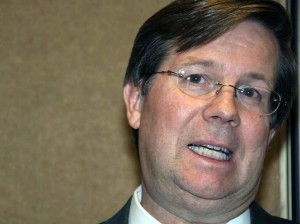
Toyota's top American executive, Jim Lentz, hopes to convince Congress that there are no electronic glitches on Toyota vehicles.
Toyota’s top American executive, Jim Lentz, will be heading back up to Capitol Hill, today, this time to tell lawmakers the embattled automaker “remains confident” it has isolated and addressed the problems behind its sudden acceleration problems – and ruled out the possibility of unexplained electronic gremlins.
Since last October, Toyota has recalled millions of cars, trucks and crossovers, the vast majority due to the possibility the vehicles could race out of control unexpectedly. So far, the maker has targeted problems like loose carpets and sticky accelerators. But critics – some of whom plan to take their case to court – insist Toyota vehicles may also have problems with electronic engine control systems.
But Lentz and other Toyota officials will tell the House Energy and Commerce Committee that all evidence indicates there are no such gremlins. The maker plans to report on more than 600 inspections it has directly made of vehicles alleged to have experienced sudden acceleration. Toyota dealers have conducted 1,400 more inspections.
Meanwhile, the consulting firm Exponent, Inc. has completed 11,000 hours of its own testing for Toyota and its conclusions are expected to support the maker’s claims – and contradict testimony delivered to Congress, in February, by a professor at an Illinois university who claimed he could simulate problems with Toyota electronic controllers.
“Significantly, none of these investigations have found that our Electronic Throttle Control System with intelligence, or ETCS-i, was the cause,” notes prepared remarks Lentz is expected to deliver to the House committee.
Though Toyota is hoping to put an end to the ongoing safety scandal with its appearance today, even the most positive response from lawmakers won’t mean the company can go back to business as usual.
The National Highway Traffic Safety Administration has two ongoing studies looking at sudden acceleration and Toyota technology.
Toyota this week paid a $16.4 million fine, the largest NHTSA can levy, for failing to advise government regulators of problems with sticky accelerators in a timely manner. During an appearance in Tokyo, earlier this month, Ray LaHood, the U.S. Secretary of Transportation, indicated DoT and the safety agency are considering additional fines against the maker.
The Toyota scandal – which has also involved faulty brakes on the popular Prius hybrid, as well as problems with excess corrosion on a number of Toyota vehicles – has triggered a move by federal lawmakers to enhance current safety statutes. Among other things, this could give NHTSA permission to act more rapidly where it finds the need to recall defective vehicles in the event, says one proposal, of the “imminent hazard of death or serious injury.”
And the fines that could be levied against an automaker like Toyota for failing to act quickly on evidence of a safety defect may also be increased substantially.
On Wednesday, a separate hearing was held on the Senate side of Capitol Hill, where lawmakers heard from NHTSA head David Strickland. The agency has been buried under tens of thousands of documents provided it by Toyota. He cautioned that the “task will take some time.”
A number of documents have so far leaked out, however, including one that created a furor prior to February’s original hearings on the Toyota crisis. It revealed the automaker celebrating the fact that it had saved hundres of millions of dollars after it convinced federal regulators to downsize an earlier recall related to sudden acceleration.
In the long run, industry analysts estimate the maker will now have to spend billions to deal with the problem to cover repairs, losses by its dealers, on lawsuits and on the hefty incentives it has been offering since March in an effort to rebuild its sales.
